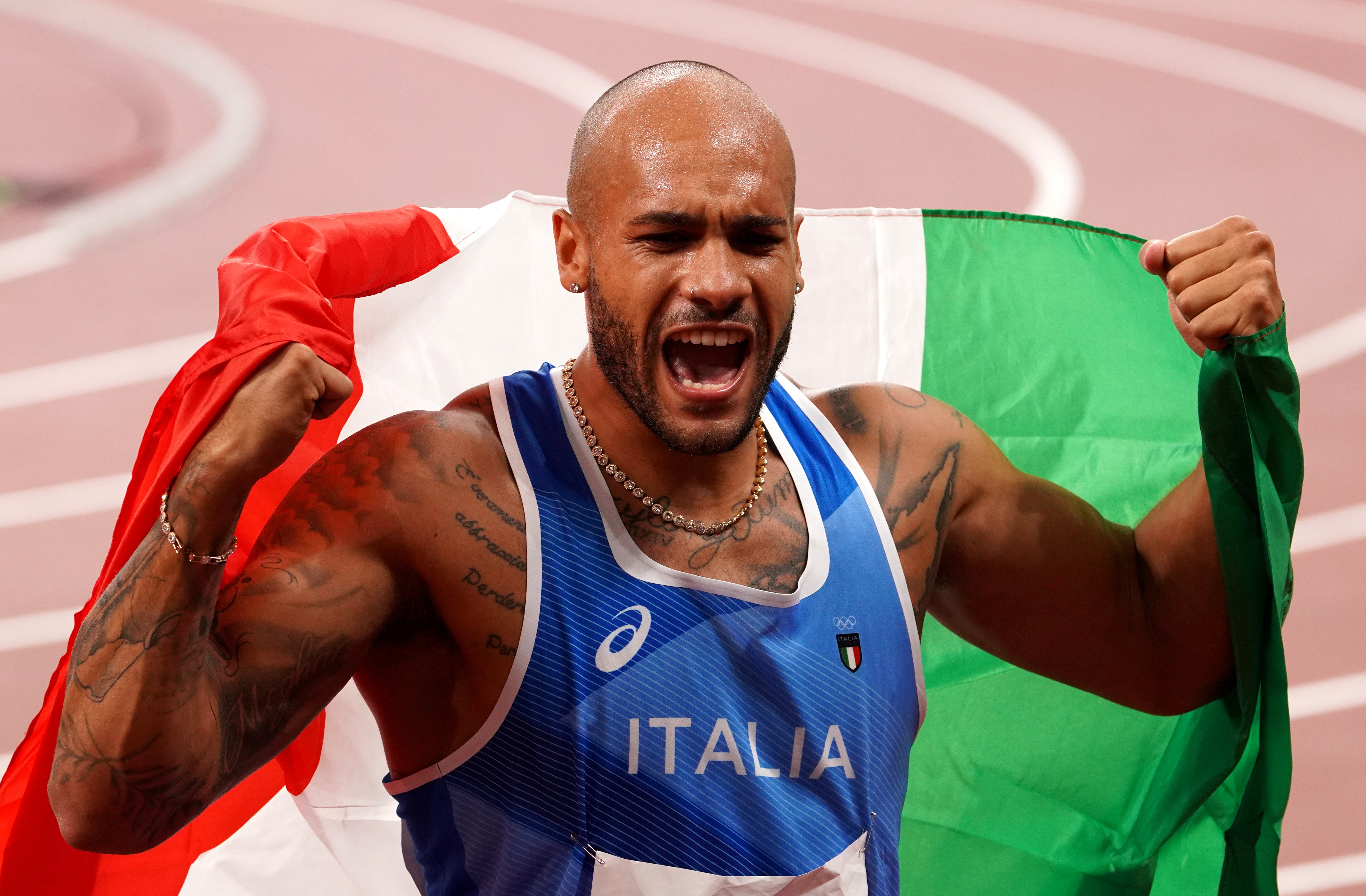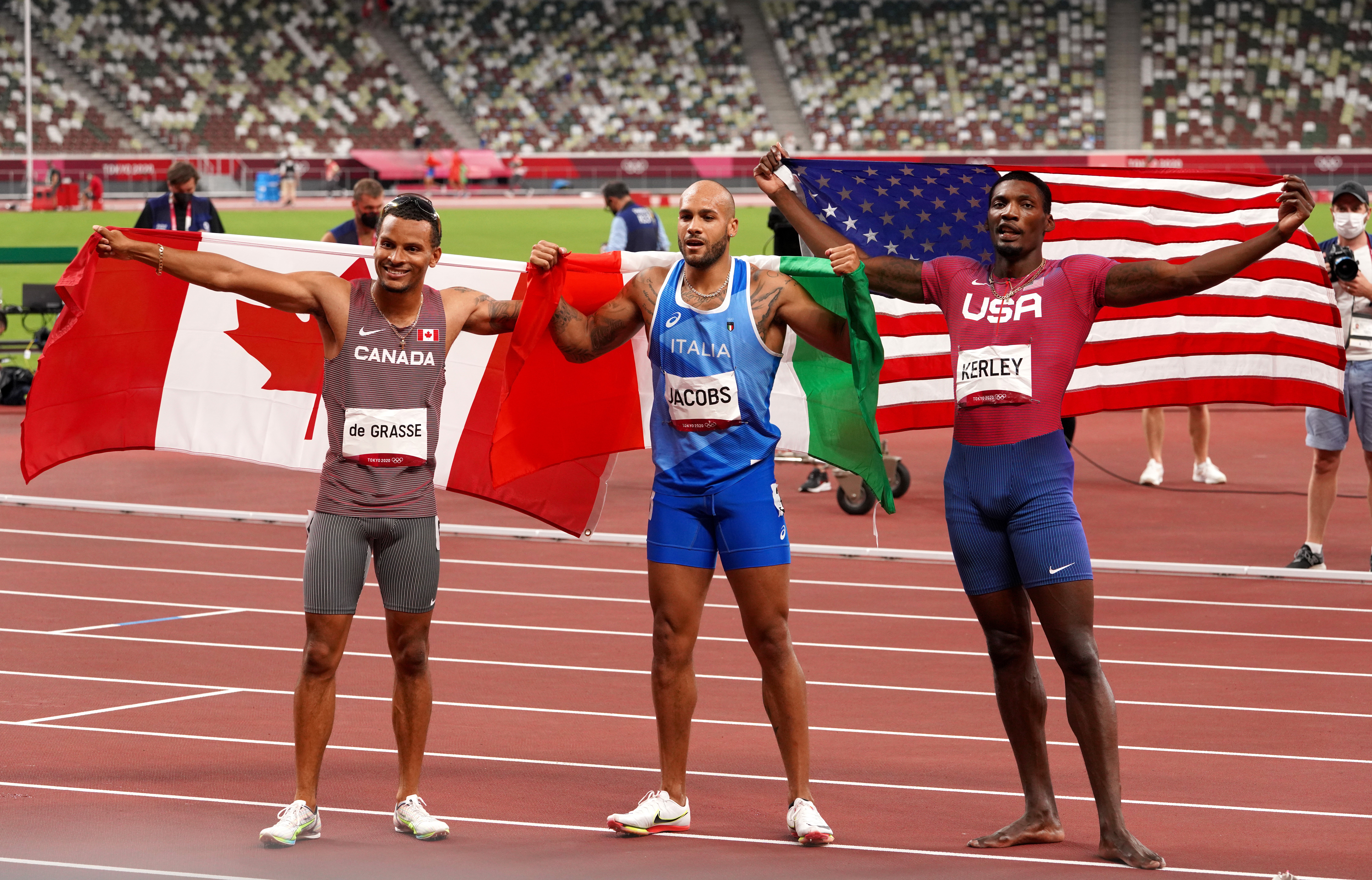Lamont Marcell Jacobs spurred to 100m gold by relationship with long-lost father
Success in sprinting after switching from long-jump focus

Your support helps us to tell the story
From reproductive rights to climate change to Big Tech, The Independent is on the ground when the story is developing. Whether it's investigating the financials of Elon Musk's pro-Trump PAC or producing our latest documentary, 'The A Word', which shines a light on the American women fighting for reproductive rights, we know how important it is to parse out the facts from the messaging.
At such a critical moment in US history, we need reporters on the ground. Your donation allows us to keep sending journalists to speak to both sides of the story.
The Independent is trusted by Americans across the entire political spectrum. And unlike many other quality news outlets, we choose not to lock Americans out of our reporting and analysis with paywalls. We believe quality journalism should be available to everyone, paid for by those who can afford it.
Your support makes all the difference.New Olympic champion Lamont Marcell Jacobs revealed repairing his relationship with his long-lost father helped inspire him to 100 metres glory.
The Texas-born sprinter clocked 9.80 seconds to win a shock gold medal in Tokyo on Sunday, finishing ahead of the United States’ Fred Kerley and Andre De Grasse of Canada.
The 26-year-old moved to Italy with his mother when he was six months old and has not seen his father, who is called Lamont Marcell and lives in Dallas, since.
But the pair began speaking last year and Jacobs believes it helped him become Olympic champion.
He said: “I haven’t seen him, we have only spoken but he wrote to me last night, saying, ‘You can do it’.
“We started speaking one year ago and this has given me a good mentality. We have started a new relationship.
“I had never gotten to know my father. We had grown apart. We hadn’t talked for some time. That relationship became a lot stronger thanks to my mental coach. She said the first thing I needed to do was establish one with my father.
“I want to thank my family that has always supported me, my children and my mum, who has been my number one fan since I was a child, and my team, who have followed me, and those who support me.”
Jacobs, the reigning 60m European indoor champion, became the first man other than Usain Bolt to claim the Olympic 100m crown since Justin Gatlin in 2004.
“What can I say? It is difficult to compare myself to him (Bolt),” the Italian said. “He is the face of the entire sport, which he has changed forever. But it’s not time to compare myself to him. We will have to see what happens in the future.”
Kerley, who won 400m bronze at the World Championships two years ago, admitted he knew little about the new champion.
“I really didn’t know anything about him. It was my first time racing him at the Monaco Diamond League (in July). He did a fantastic job,” he said.
“I executed the race perfectly and I came up with a silver medal. I can’t complain. The race was a beautiful race. I got a personal best and a silver medal. I am blessed to be at the biggest stage of my career.”
De Grasse added: “With this one there was more expectation for me and my country. I still have a lot of work to do but I felt good about the race and got the job done.”
Zharnel Hughes the first Briton to reach a men’s Olympic 100m final in 21 years, was disqualified for a false start and was forced to watch from the sidelines. He admitted afterwards he had cramped up and had no alternative but to move early.
Yohan Blake missed out on the race, meaning there were no Jamaicans in the final for the first time since Sydney 2000.

The 31-year-old, the joint second fastest man in the world, then insisted it would be his last Games.
“It’s definitely my last Olympics. You know track is not easy. I won’t be ungrateful. I’ve gained a lot,” he said.
Hughes stormed to win his semi-final in 9.98secs – the first time he had run sub-10 this year.
After Daryll Neita made the women’s final on Saturday, it was the first time in 37 years – since the Los Angeles Games of 1984 – that Team GB had athletes reach both finals.
Reece Prescod was disqualified from the first semi-final for a false start, while CJ Ujah finished fifth in 10.11secs to bow out.
“To be honest it’s just my fault, I’m not going to shy away from it, not going to blame anything, or make an excuse for it,” Prescod said.
“I’m a professional athlete. I shouldn’t have false-started – I was amped up, I was really, really amped up.”
Jacobs’ win came quickly after team-mate Gianmarco Tamberi shared the men’s high jump title with Qatar’s Mutaz Essa Barshim after they both cleared 2.37 metres.
An appeal for Team GB’s Daniel Rowden was being considered following the men’s 800m semi-final after claims he was impeded. The 23-year-old missed out on the final along with Elliot Giles.
Sisters Tiffany Porter and Cindy Sember missed out on the 100m hurdles final after coming fifth and seventh respectively in the semi-finals.
Venezuela’s Yulimar Rojas won the women’s triple jump and set a huge new world record of 15.67m.
Earlier, Abigail Irozuru qualified for Tuesday’s women’s long jump final after a season’s best of 6.75m.
She was joined by Jazmin Sawyers, who finished in the top 12 after jumping 6.62m, although Lorraine Ugen failed to progress with a jump of 6.05m.
Lizzie Bird became the first British woman to reach the steeplechase final after finishing fifth.
Join our commenting forum
Join thought-provoking conversations, follow other Independent readers and see their replies
Comments